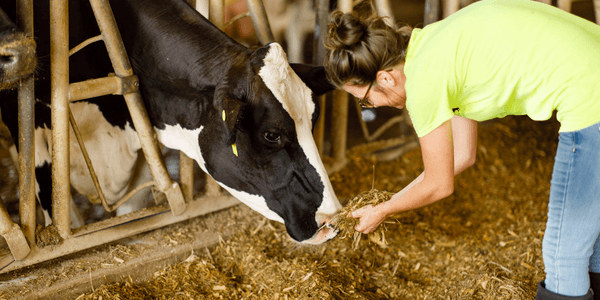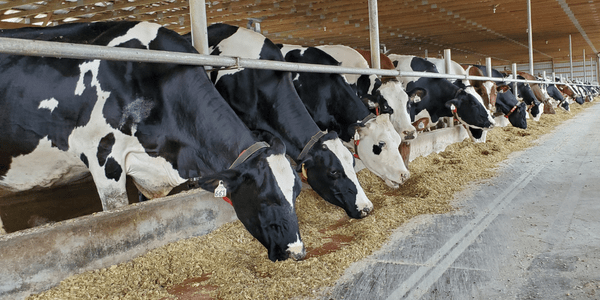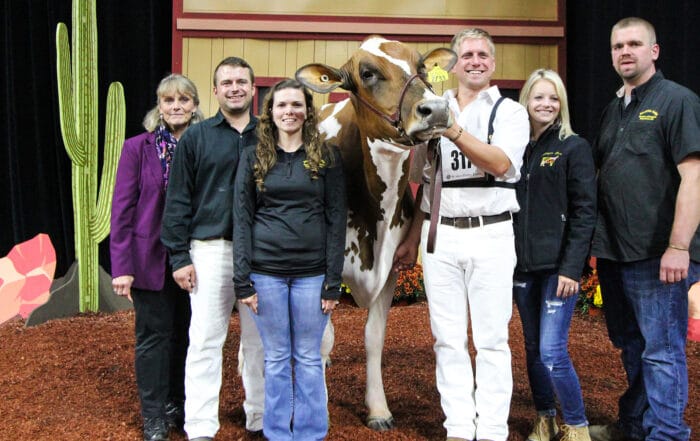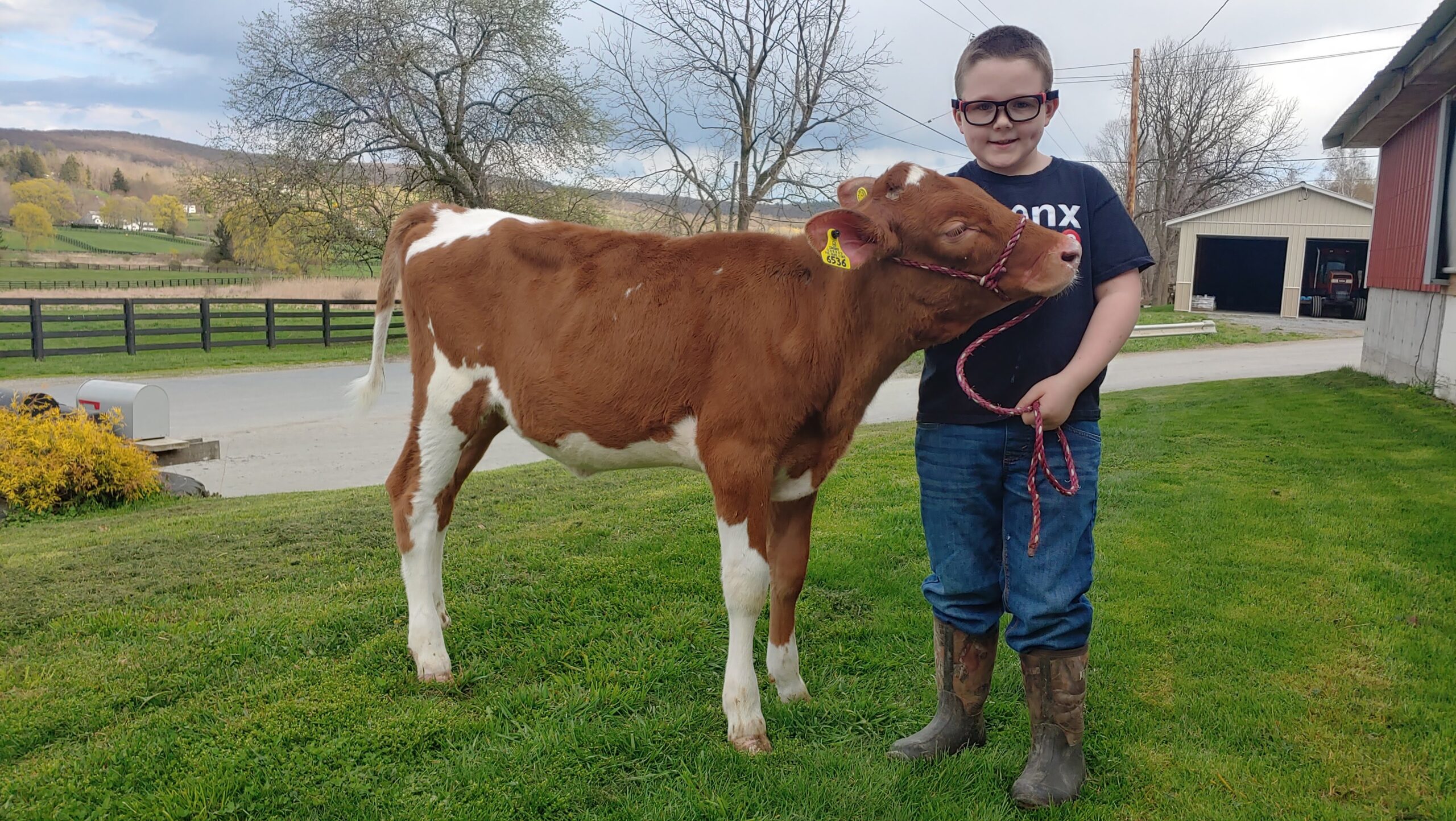Curious about what a dairy farm is, how cows behave on a farm, or how dairy farms practice sustainability? Learn new fun facts about dairy farming by clicking common questions below.
A dairy farm is a place where cows are cared for and milked to produce dairy products for people to enjoy. Dairy farming is the practice of raising these cows to produce those dairy products (milk, cheese, etc.) for human consumption. These farms range in size from small family-run operations to large commercial enterprises. Modern farms incorporate technology to ensure efficiency, sustainability, and the well-being of the animals.
One of the most important aspects of dairy farming is herd management. Farmers carefully monitor their cows’ health, nutrition, and milking schedules to maintain high-quality milk production.
Dairy cows have a diverse and balanced diet to meet their nutritional needs and support their overall health and milk production. The specific feed and diet of dairy cows vary from farm to farm, depending on factors such as location, climate, and available resources.
A Total Mixed Ration (TMR) is a method of feeding dairy cows that involves blending various feed ingredients into a well-balanced and homogeneous mixture. This approach ensures that each cow receives a precise and consistent combination of nutrients in each bite. Some of the most common elements of TMR include hay, silage, grains and concentrate, protein supplements, vitamins and minerals, byproducts and feed additives.
Cows can eat all sorts of things that humans can’t, in fact up to 80% of their diet is food that cannot be eaten by humans. This includes byproducts of other industries like cotton seeds, citrus pulp, brewer’s grains from alcohol production, candy waste, bakery waste, and more. By eating them cows help keep the byproducts out of landfills!
Dairy cows are typically milked two to three times a day. The exact frequency can vary depending on the farm’s management practices, the cow’s lactation stage, and other factors. Each milking takes approximately 10 minutes.
Milking a cow multiple times a day helps prevent discomfort due to overfilled udders and ensures that the milk production is maximized. Dairy farmers aim to provide regular milking schedules to maintain the health and productivity of the cows and to ensure a consistent supply of milk.
The amount of milk a cow produces in a day can vary widely based on factors such as the cow’s breed, genetics, diet, age, health, and overall management. On average, a dairy cow in the United States produces about 6 to 7 gallons (23 to 27 liters) of milk per day.
It’s important to note that these figures are general averages and individual cow production can vary. Dairy farmers use various methods to optimize the cows’ health and nutrition to maximize milk production while ensuring the well-being of the animals.
No! It’s important to know that there are no antibiotics in the milk you drink.
Cows can get sick, and just like humans they sometimes need medicine to get better. Dairy farmers use antibiotics to provide the best possible care for their cows, with guidance from the farm’s veterinarians. Farmers use strict on-farm practices to ensure that milk from cows treated with antibiotics never leaves the farm.
When a cow is treated with antibiotics their milk is collected separately and discarded until it tests free of any trace of antibiotics. In addition to on-farm safety measures, all milk is tested for antibiotics upon delivery at the processing plant and any milk that tests positive cannot be sold to the public.
Strict government standards and industry protocols ensure that milk is wholesome, safe, and nutritious.
No! Dairy farmers follow stringent government standards to ensure that all milk – whether organic or conventional – is safe, wholesome and nutritious.
Bovine somatotropin (bST) is a hormone that occurs naturally in all cows. Its physiological function is to help young cattle grow, and adult cows to produce milk. A small amount of bST is naturally present in all milk.
A synthesized copy of bST – recombinant bovine somatotropin (rbST) – is available for farmers who choose to use the hormone as a farm management tool to boost their herd’s milk production. Health authorities such as the Food and Drug Administration (FDA) and the National Institutes of Health (NIH) have determined that milk from cows treated with rbST is both nutritious and safe.
Most of the milk found at the grocery store is from cows not treated with rbST and is often labeled as such.
Milk is pasteurized to kill harmful bacteria, parasites, and other pathogens that may be present in raw milk. Pasteurization is a precise process which heats milk for very specific amounts of time and at certain temperatures to kill bacteria and germs, but not alter the nutrition or taste of the product. It significantly reduces the risk of foodborne illnesses associated with raw milk consumption, making dairy products safer for consumers.
Pasteurization has made milk one of the safest foods in the world. Before pasteurization milk could not be stored for very long and it was not easy to transport. With pasteurized milk, you can feel confident knowing that your milk is not only good for you, but safe and easy for you to purchase at a grocery store near your home.
Yes there are differences between conventional, organic, and grass-fed dairy products, but they aren’t what you might expect.
All milk produced in the United States must adhere to the same strict federal standards for quality, purity, and sanitation. The terms organic and grass-fed have very specific meanings in the dairy industry.
Organic – Those using the “USDA Organic” seal must ensure that milk comes from dairy farms the meet the following criteria:
- Cows are exclusively given food grown without the use of pesticides or commercial fertilizers
- Cows are given periodic access to pasture
- Cows are not treated with supplemental hormones
- Cows have not been given certain medications to treat illnesses.
Grass-fed – There is not a specific, unifying label for the certification of grass-fed dairy products. If milk has a grass-fed label on it, this generally means that the milk comes from cows who were fed a grass and forage-based diet.
No matter what farming practices a dairy farmer chooses to follow, all dairy farmers follow high standards to ensure that their cows and land are well cared for.
Dairy farmers work hard every single day to make sure their cows are as comfortable as possible! Cows always have access to fresh food and water and a dry place to lie down. During the summer, fans and misters keep cows cool.
In the winter, calf jackets keep calves warm, and thanks to cows’ thick skin, hair, and natural insulations they prefer temperatures a little cooler than most humans. Cows don’t mind the cold when they are well fed, healthy, and have dry bedding. Barns provide shelter for cows from the heat, cold and snow.
Cows are a dairy farmer’s first priority. Whether it’s providing regular veterinarian visits, specially formulated diets, or ensuring cows are comfortable, dairy farmers take excellent care of their animals.
Farmers also participate in a program called The Farmers Assuring Responsible Management program, or FARM, which works with dairy farmers, cooperatives and processors to show consumers that the dairy industry is taking the best care of cows and the environment, producing safe, wholesome milk, and adhering to the highest standards of workforce development.
Created by the National Milk Producers Federation in partnership with national dairy checkoff, Dairy Management Inc., FARM demonstrates that U.S. dairy farmers are committed to producing the best milk with integrity.
The living conditions of dairy cows vary widely depending on farming practices. Two common systems are conventional housing and pasture-based systems.
In conventional housing cows are kept in large barns or other indoor facilities that are designed to provide shelter, food, water, and healthcare in a controlled environment. This type of housing is common in areas with harsh climates where outdoor grazing may not be practical year-round.
In a pasture-based system dairy cows are allowed to graze freely outdoors on pasture when weather conditions permit. Pasture-based systems aim to provide cows with access to fresh grass, exercise, and natural behaviors like grazing.
In the United States, stringent standards and regulations are in place to ensure the quality and safety of dairy products. These regulations are designed to protect consumers from foodborne illnesses and to maintain the integrity of the dairy industry.
In the United States there are strict quality controls put into place from when the milk is collected from the cow all the way until it appears on the shelf at your local grocery store. You can learn more about Milk’s Farm to Table Journey on this page and in the video below.
By following recommended conservation practices, dairy farmers are able to maximize production while minimizing impact to their land and environment. Did you know that more milk is produced today with only approximately 9 million cows, than it was in 1944 with 26 million cows?
These practices are essential for minimizing pollution, conserving natural resources, and ensuring the long-term viability of the dairy industry. Dairy farmers continuously work with government and university experts to find even more ways to conserve natural resources.
Some of the measures taken by dairy farms to reduce their environmental footprint include:
According to the latest research the U.S. dairy industry accounts for less than 2% of total U.S. greenhouse gas emission. In fact, U.S. dairy, per gallon, has the lowest carbon footprint of any country in the world.
Dairy farmers are working on ways to reduce that figure even more. Over a recent 10-year period, dairy farming used about 21% less land, 30% less water, 20% less fuel, and 17% less feed.
The work continues as the dairy industry has committed to achieving greenhouse gas neutrality by 2050.
Like all animals, dairy cows produce manure and manure management is a big part of a dairy farmer’s job.
Dairy farmers don’t think of manure as waste, instead they recognize it is a valuable resource that is put to good use on and off the farm. This can include using manure for composting, as fertilizer, turning it into electricity, or separating the solid and liquid components and using clean recycled solids for cow bedding.
Dairy farmers are always working on new ways to manage manure and ensure their farms stay sustainable for the future.





